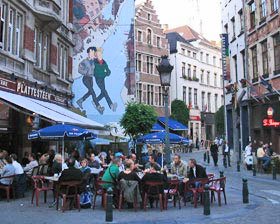
Brussels Gay Travel Guide 2025
Upcoming Events in Brussels
@ Cinéma Nova (et al) (3 Rue d'Arenberg / Arenbergstraat)
About Brussels and its gay life
Brussels is the capital and residential city of the Kingdom of Belgium (beginning with the independence of Belgium in 1830). In Brussels you can find among other things the headquarters of the European Union and the registered offices of the NATO headquarters and the WCO. Consequently, numerous international companies, associations, cultural institutions, embassies and the worldwide press accumulate in Brussels and turn it into a major economic, scientific and cultural center with an international atmosphere. Also the numerous immigrants from the erstwhile Belgian colony of Congo and former guest workers from Morocco and Turkey contribute to this international atmosphere.
Lovers of architecture will not want to miss the Grand Place (Grote Markt) with its Gothic town hall and the baroque facade fronts. It is considered one of the most beautiful market places around the world and became a UNESCO World Heritage Site in 1998. Other architectural landmarks include the Cinquantenaire park with its triumphal arch, the Brussels Stock Exchange, the Palace of Justice and especially the numerous well-preserved art nouveau buildings spreading all over Brussels. Victor Horta was the most important representative of Brussels Art Nouveau. Even the Comic Museum (Brussels is after all the capital of Belgian comics – just think of Tintin, the Smurfs, Lucky Luke, Marsupilami etc.) is housed in a former art nouveau department store designed by Victor Horta – the perfect marriage of two artistic styles that shaped the character of Brussels.
Belgium used to belong to the countries in Europe with a very conservative attitude towards gays until the mid-1990s and then became one of the most progressive countries regarding gay rights within a few years. For instance, it took more than 25 years after the Stonewall riots in New York for the first Gay Pride march to happen in Belgium's capital Brussels – but now gays and lesbians in Belgium have better legal rights and a higher gay self-confidence than in many other countries.

Most of Brussels' gay bars and shops are located in the
city centre
along and around the street Rue du Marché au Charbon
(or Kolenmarkt – Brussels and its street names are bilingual: French and Flemish).
The gay bars in this street are usually very crowded on Saturday nights,
with people often occupying the street.
Gay parties in Brussels like La Demence are known Europe-wide and attract guys from all over Belgium as well as from its neighbours France, Germany, Netherlands and other countries. European integration is a reality here.